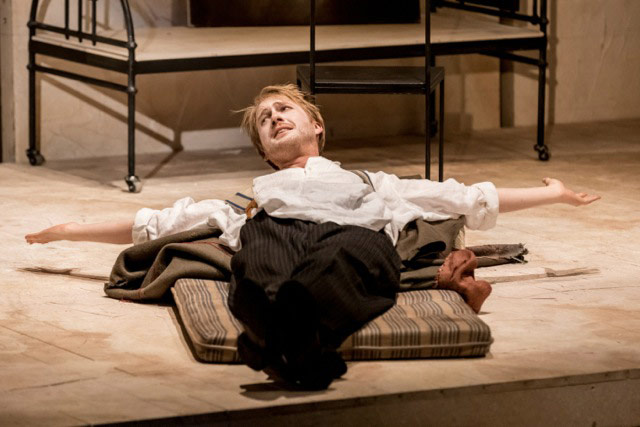
Spotlight on: Michael J. Scott
InterviewAmerican tenor Michael J. Scott is making a name for himself in Europe, both in leading roles (Don José, Rodolfo), and in comprimario repertoire. With standards like Monostatos (Die Zauberflöte), Don Curzio (Le nozze di Figaro) and Erster Jude (Salome) under his belt, Scott’s character work has also brought him one-of-a-kind professional experiences in Philip Glass’ The Trial, and Barrie Kosky’s eye-popping production of Shostakovich’s The Nose.
This month, Scott sings the role of Sopel in Rimsky-Korsakov’s Sadko at Opera Vlaanderen. We spoke with him about how he stays inspired at work, and the surprising reason he’d love to sing Mimì.
Why do you sing, and why are you doing it professionally?
The first part is easy. I sing because it’s fun. When it’s not fun, something is wrong, and I need to fix it so it’s fun again.
If you’re asking why am I able to sing professionally, that’s even easier. I have a career because of a modest amount of hard work and mountains of support and dumb luck. I’ve had my parents who’ve driven to every voice lesson, built high school musical sets, traveled to see my shows, then my teachers (Maitland Peters at MSM and Justin Lavender in London) who beyond teaching technique were patient and helpful as I figured out what I wanted to do and who I wanted to be as a performer, and now you can add my wife, a violinist herself, who handles the house and children, and makes sure I’m always prepared so I can disappear for two months while maintaining her own career.
I’ve met people who are building their careers without that support system and I have no idea how they do it. And as for luck, I have gotten so many more opportunities because of ‘right place, right time’ or simply bumping into someone unexpected than auditioning.
What does “good singing” mean to you? What does it feel like when you achieve it?
Good singing on stage doesn’t mean perfect technique to me. It’s about letting your singing serve the story and your character. You can have perfect music sung perfectly and it be very boring, for the singer and the listener. But taking the right risk at the right time makes it something more, something special.
To me it feels like riding your bike down a big hill. Maybe a little careful at first, ride the brakes till you get a feel for things, but then let yourself gain speed and roll down. Sometimes you coast smoothly to the end, sometimes you fall and get a little scraped up. Either way it’s exciting.

What do young singers need to do more of? What should they do less of?
Young singers need to take in more variety. Watching people perform can be the best way to learn, but there’s more than opera singing, there’s more than classical music. Looking for wonderful singing? Listen to Terfel. Want to see a complete devotion to the music? Watch Solti conduct his Ring recording sessions. Want to see how to be in control of the stage? Watch Bruce Springsteen or Freddie Mercury.
As for what not to do, I can say as the most guilty party, stop bitching and moaning. It doesn’t help anything and will put you in a terrible place emotionally. It is tempting and easy to sit around complaining about the system, about other singers, about the schedule being late again, but it’s just a waste of your time and energy.
Do you have any “bucket list” roles you’d like to sing (realistically or otherwise)?
When I was studying I had the standard big tenor lead role dreams. The one that stood out the most was Canio. He has so much passion from beginning to end, with this danger bubbling underneath that you can let explode at the finale. Plus the aria of course. Since I’ve been doing more character roles I’ve been thinking a lot about Loge and Mime in the Ring, Loge especially. Everything he says and does is calculated, each word carefully chosen for his audience. He’s the opposite of me in that way really, so it will be exciting to try to find that character on stage.
My ridiculous dream is Mimì, but that is completely and entirely because I was always jealous of her bed while I was kneeling on the floor.
What have you learned about your career as a singer, solely through professional experience?
You have no idea what success will look like. When I got to New York almost fifteen years ago, I expected to be a headliner in London and Vienna and the Met before I was thirty. I wasn’t. But what I’ve been able to build, with lots of help, has been very unexpected and incredibly exciting. It’s a bit early to say I’m successful, but I’m comfortable saying I’ve had some nice success so far.
Do you know an artist who deserves a little Spotlight? Let us know! Get in touch at [email protected].


Comments